IOS-Jamia Millia Islamia organises Five-Day Summer School on Islamic Studies
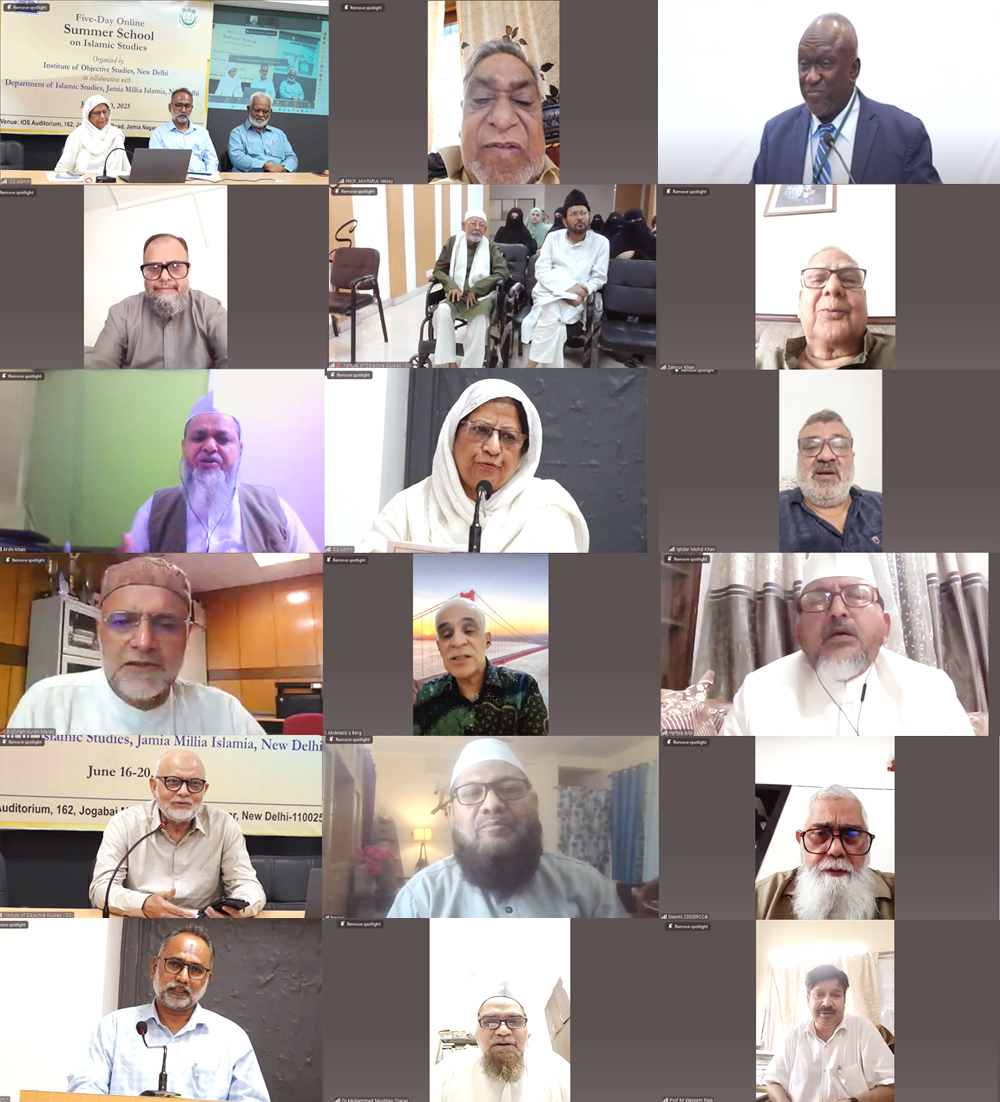
IOS-Jamia Millia Islamia organises Five-Day Summer School on Islamic Studies
New Delhi: A five-day online summer school on Islamic Studies was organised by the Institute of Objective Studies (IOS) from June 16 to 20, 2025 in collaboration with the Department of Islamic Studies, Jamia Millia Islamia, New Delhi. The purpose of organising the summer school programme was to impart basic, but deep knowledge, to the university students pursuing professional courses, like business studies, science, computer science, engineering, medicine, etc. It was also an outreach programme to introduce the IOS to a new and larger audience, particularly the students who constituted as future leaders in medical science, technology and business studies. Thus it was very necessary to acquaint them with the fundamental teachings of Islam as well as the great role it played in the making of global human civilisation.
Day-I (June 16, 2025)
Inaugural Session
The opening session began with the recitation of a verse from Qur’an by the senior Urdu journalist and writer Ahmad Javed.
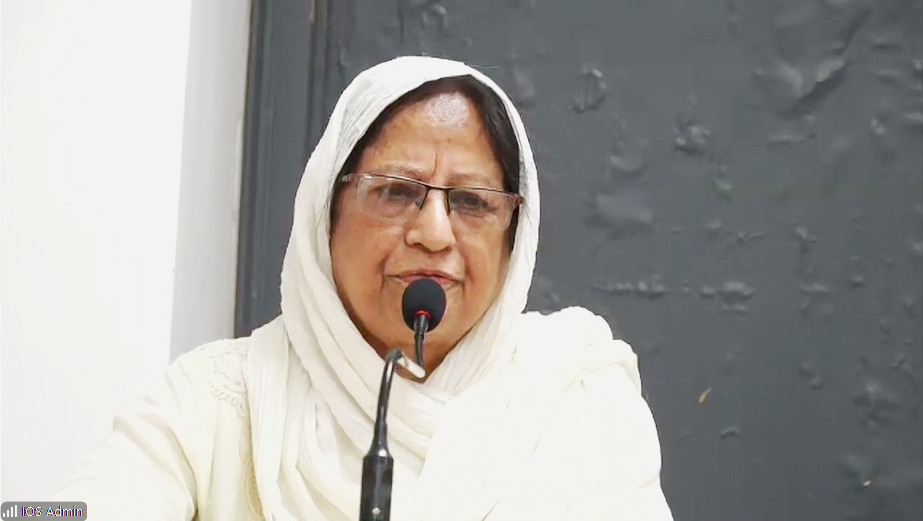
In her welcome and introductory remarks, vice-chairperson of the IOS, Prof. Haseena Hashia, briefly spoke about the activities of the Institute. She said that established in 1986, the IOS was involved in focusing on the national issues, particularly relating to the problems of the minorities in general and Muslims in particular. It did its best to promote the ideals of secularism, democracy, rule of law, federalism and constitutionalism. The Institute had so far published around 500 books on a variety of subjects. Besides, about 6 journals in Urdu, Arabic and English are regularly published. There are two web-magazines, namely, IOS Current Affairs and IOS Nuqta-e-Nazar. More than 1350 international and national conferences, symposia and workshops have so far been organised. About 475 projects have either been completed or are at various stages of completion. She observed that the IOS was maintaining an updated data bank to cater to its needs. In addition, scholarships are awarded to meritorious but needy students pursuing post-doctoral research in universities. The Institute has also instituted IOS Shah Waliullah Award and the IOS Lifetime Achievement Award. The IOS calendar published annually has become very popular, she held.
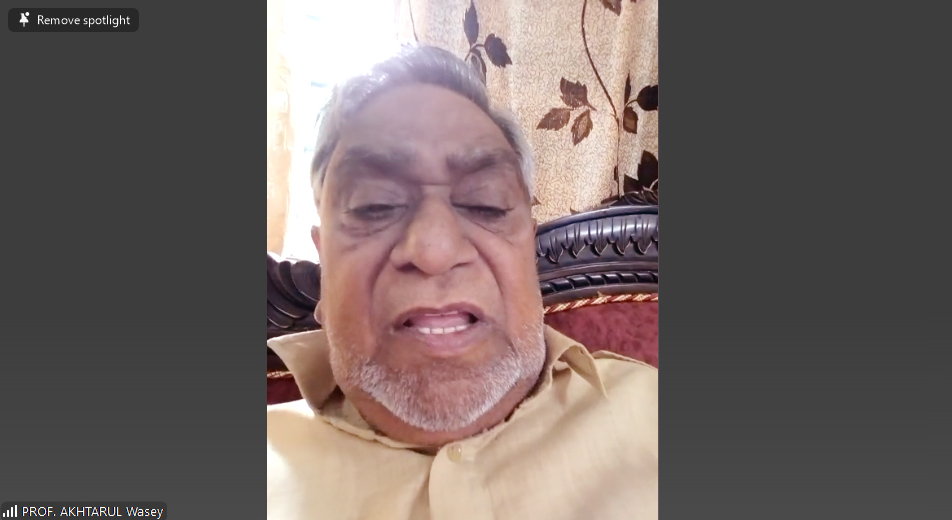
As a key speaker, former Vice-Chancellor, Maulana Azad University, Jodhpur and currently professor emeritus, Islamic Studies, Jamia Millia Islamia, Prof. Akhtarul Wasey, observed that in Islamic Studies, there was text along with the context. The Aligarh Muslim University was the first academic institution which introduced Islamic Studies as a subject. Later on several other universities included it in their curriculum. He said that Islamic politics in society and economics were viewed in Islamic Studies in the Islamic perspective. But the tendency to defame Islam was comparatively a new phenomenon which called it a religion of jihad. There is reference to jihad, but that does not mean committing excesses on anyone. No will could be forcibly imposed on anybody. The Qur’an and Hadith are complete in every respect as they have answer to every problem. He said that there were differences of opinion among the schools of thought. If Hanafi school says that eating tortoise was not permissible, it is permissible in Shafi’i school of thought. But that does not constitute a fault on the part of the believer. Food habits change with the change of geographical location of a country.
Prof. Wasey held that eating tortoise in the majority areas of the followers of Shafi’i school, was not prohibited. He said that the Qur’an and Hadith were popularised to guide humanity for a better life. Sufi hospices played a key role in popularising Islam outside the Arab peninsula by way of love, sympathy and compassion. Islam gave a leverage to human beings to understand and examine it. He expressed the confidence that the new students would bring revolution in the world by cherishing the values of Islam, like brotherhood, compassion and equality.
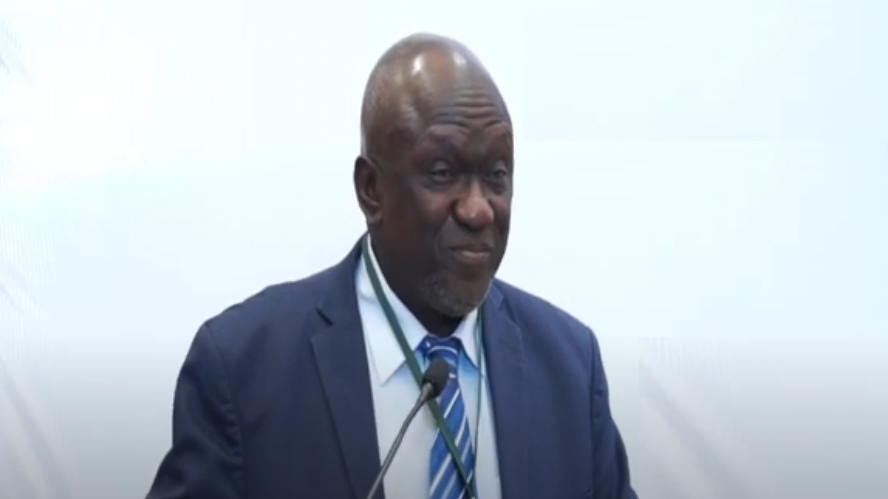
Speaking as the guest of honour, Secretary General, International Institute of Islamic Thought, USA, Prof. Omar Hasan Kasule, held that summer school was important for understanding Islam. Referring to Tawheed, he said that the essence of Tawheed was to understand Allah. Tawheed Al-Rububiyat was about Creator and the Creation. Explaining further, he noted that there is one creation of universe. The Sun and the Moon were created by Him. They have one Creator, Qur’an says this. He created certain class. He is one Creator only. He is the only one worthy of worship. Then there is Tawheed Al-Uluhiyaat. This means we humans do not understand His worship. He created systems and fixed them. Science and technology are part of them. He produces things that are beneficial for man.
Prof. Kasule pointed out, that there was Tawheed Al-Rububiyat. This is the basis of physical and social laws. He said that people sometimes disobeyed social laws. Commenting on Maqaasid Al-Tawheed, he said that this was the Islamic world view. He also spoke on Tasawwur.
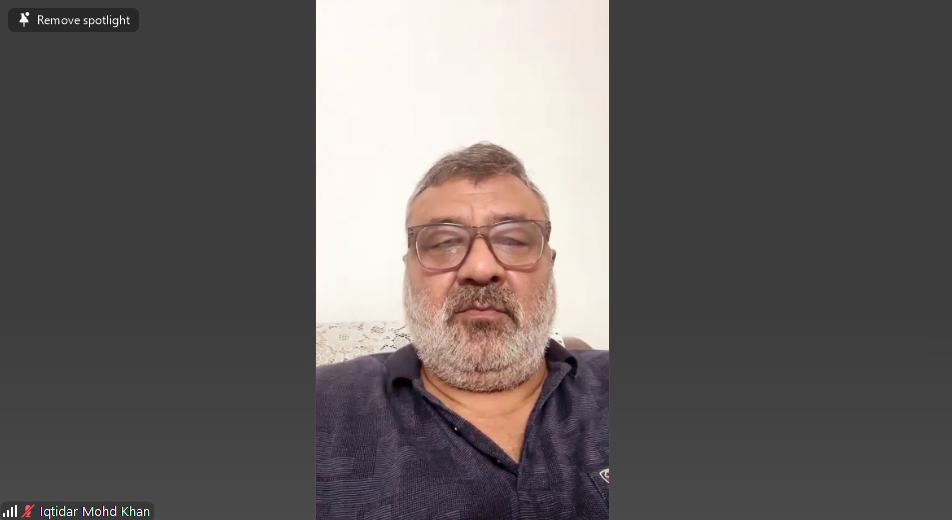
Presiding over the session, Dean, Faculty of Humanities and Languages, Jamia Millia Islamia, Prof. Iqtidar Mohammad Khan, observed that Dr. Mohammad Manzoor Alam planted a sapling which has now grown up as a tree. His efforts to build an institution for the objective studies bore fruits and today the IOS is known all over the world. Referring to the summer school on Islamic Studies, he said that students of the universities would benefit from this. He held that Prof. Akhtarul Wasey took off the time to speak as the key speaker despite his bad health. He noted that Islam was the simplest religion and the most adjustable one. This is the reason why it is the most acceptable and has its presence in every region of the world. Islam had four elements – eating and taking of unprohibited drinks, language, beliefs and uniform. This religion has its presence in every climatic zone and geographical region. There is no leverage in faith. But it adjusted with the culture of the region where it travelled. It adopted the uniform of the region. Caps and the clothes were the symbols of the local culture which included food habits and customs in so far as they did not clash with the inhibitions under Islam. Meaning thereby, the local culture was accepted according to the Islamic faith. In our society, all the faithful were adjusted. It could be understood in terms of the prayer (Namaz) which be led by an Aalim of any caste within Islam. The Qur’an calls for establishing lasting association with Allah to seek Najaat (Salvation).
Prof. Khan explained that all schools of Islamic thought were at a commonplace that Allah is one, Qur’an is one and the Prophet (PBUH) is one. This distinguishes Islam from the other religions. He called upon the participants to know about the history of Islamic civilisation. There were presently 57-58 Muslim countries in the world, but there was no unanimity among them on many vital issues. We must look at our culture and civilisation, and our actions should be in accord with Deen. He called for giving a thought to whatever is being listened. Let’s learn from the life of the Sahaba. The life of the Prophet (PBUH) is a model for us to see him as a prophet as well as an Arabian. He said that one should not be self-centered but should also think of the well-being of the community. He reminded the Muslims of their responsibility to subserve the interests of the Ummah.
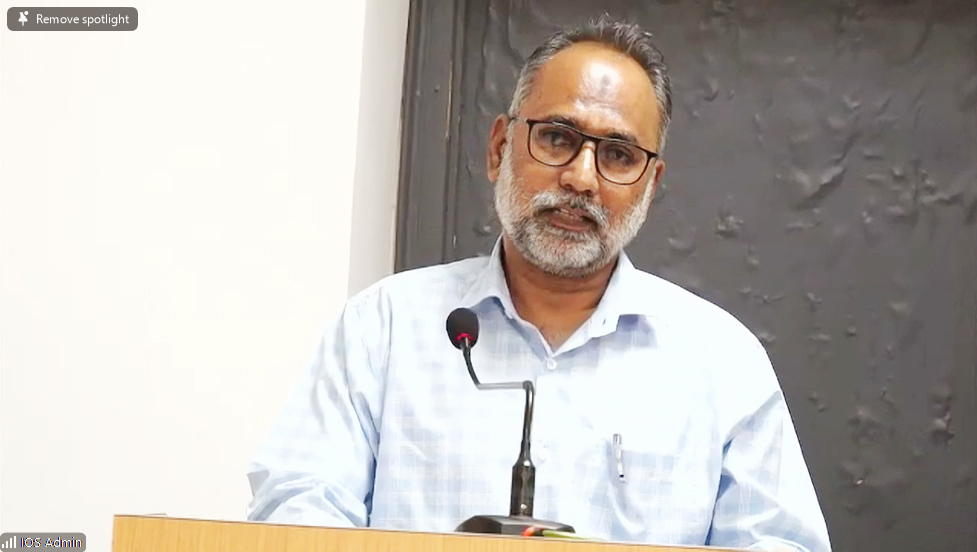
Assistant professor of Islamic Studies, Jamia Millia Islamia, Dr. Mohd Arshad spoke about the usefulness of the summer school programme. He said that in 2020, the IOS signed a Memorandum of Understanding (MoU) with several universities, including the Jamia Millia Islamia, to jointly organise a short-term summer and winter school courses on Islamic Studies for the university students pursuing different professional disciplines. He said that the course was designed to acquaint them with the basic knowledge of Islamic teachings and the role of Islam played in the history of global human civilisation. This programme is especially useful for the first-timers. Experts in various areas of Islamic Studies have been invited to address the students and the participants. He extended a vote of thanks to the participants at the close of the inaugural session.
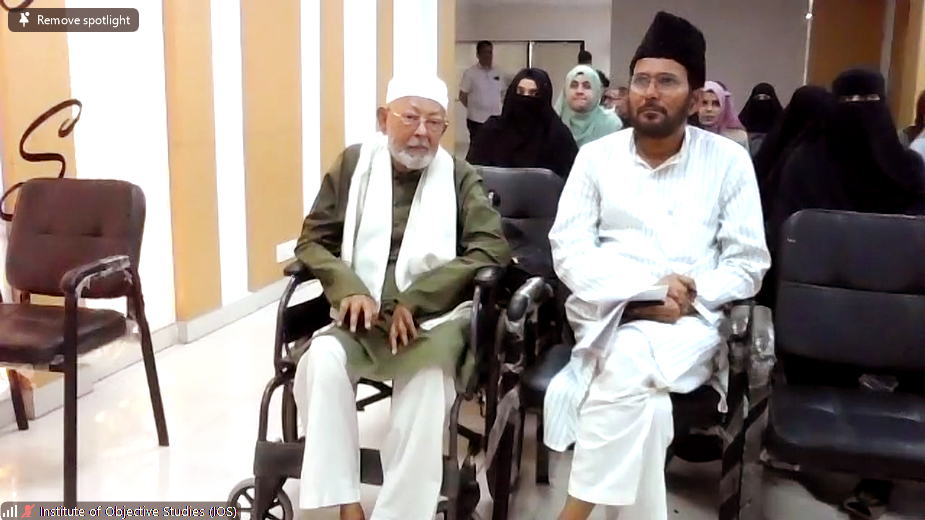
Dr. Mohammad Manzoor Alam, Chief Patron, Institute of Objective Studies was also participated in inaugural session.
Business Session-I
Lecture-1
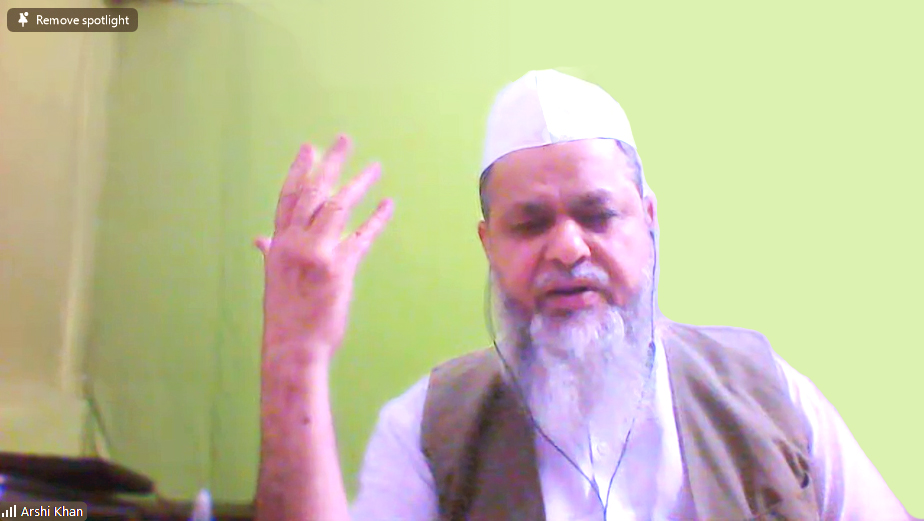
The first lecture of the business session-I was delivered by the professor of political science, Aligarh Muslim University, Prof. Arshi Khan. He spoke about Islamophobia in the modern context. He said that Islamophobia was the hatred against the Islamic faith. It was misunderstood and had a self-calculated objective. It was also a politics rooted in various cultures. This was unethical and radical. In politics, it is the misuse of power. It is multi-dimensional at domestic, national and regional level. It came in 1910 onwards. Today, it has international presence. Recently, one finds it in Chechnya, Herzegovina in Central Asia. It was found in Western Europe, brutal killings of the followers of Muslim faith took place in Croatia. It was done in Britain and Russia. It was aimed at “divide and rule” in socially united countries. They divided the country into Christians and Muslims on the basis of religion. In Tsarist Russia, there were Tatars and Chechens who were persecuted. Earlier, India did not have the concept of majority-minority divide. Then came the Shia-Sunni conflict. He said that regional factors also had a role to play.
Prof. Khan held that the phobia against independent and the national leaders like Nasser and Saddam Hussein in the Middle East was exacerbated. Hatred against the leaders was developed by the Western powers following the emergence of Hamas in Gaza. Muslim phobia, the Qur’an phobia, Iran-Iraq war in 1979, Iraq-Iran phobia, was spread by Western powers. In India, Islamophobia was spread at local and regional level. Islamophobia gripped several countries like Germany, Italy, Denmark, etc. He noted that the specter of Al-Qaeda was kept alive by Western powers. He maintained that a mindset was created by the media in society for political power because it benefited some people and leaders. One of the purposes of Islamophobia was to have dominance in politics. This was caused by the failure of law and order and the rule of justice. Besides, government-controlled TV channels and private channels presented religious programmes which had a bearing on the mindset of the people. Individual attempts on social media platforms were made to spread hatred against Muslims. All democracies have become a fiction and non-functional. Not only Israel, but also other Western countries were using IAEA to inspect nuclear sites for suspected nuclear arms manufacturing facilities in Iran and other Muslim countries. He said that nine countries were using Islamophobia as instruments like ballistic missiles.
Lecture-2
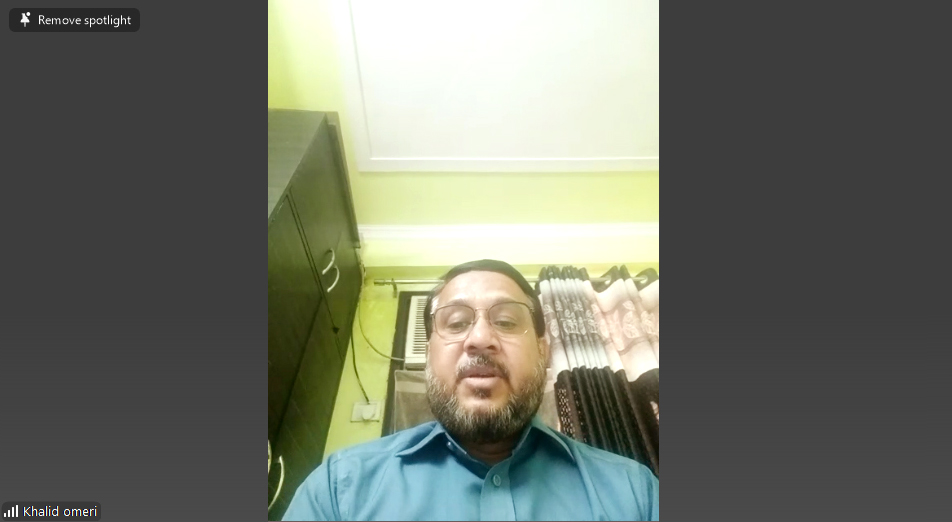
The second lecture focused on “Jama wa Tadween Qur’an”. The speaker of the topic was assistant professor of Islamic Studies, Jamia Millia Islamia, Dr. Mohd Khalid Khan. He said that the Qur’an is the book read by the largest number of people. The Qur’an is the word of Allah which was revealed to Prophet Muhammad (PBUH) in phases and completed over a period of 23 years. The Qur’an was memorised and preserved in heart. Qur’an was written serially and the Prophet (PBUH) recited the Surah in the presence of Sahabas who used to repeat and memorise them. This is incorrect to say that only four Sahabas memorised the Qur’an. In fact, Ansars and Sahabas too memorised the Qur’an. There were a number of Sahabas who memorised Qur’an but could not read out before the Prophet (PBUH). In early years, the Qur’an was written on the twigs and leaves of date trees, leather and the pieces of stone. The Prophet (PBUH) used to explain every Surah. The Qur’an was serialised on His instructions so as to ensure that there was not iota of doubt. The Qur’an continued to remain in the original shape. He said the Qur’an is much above human expectation.
Lecture-3
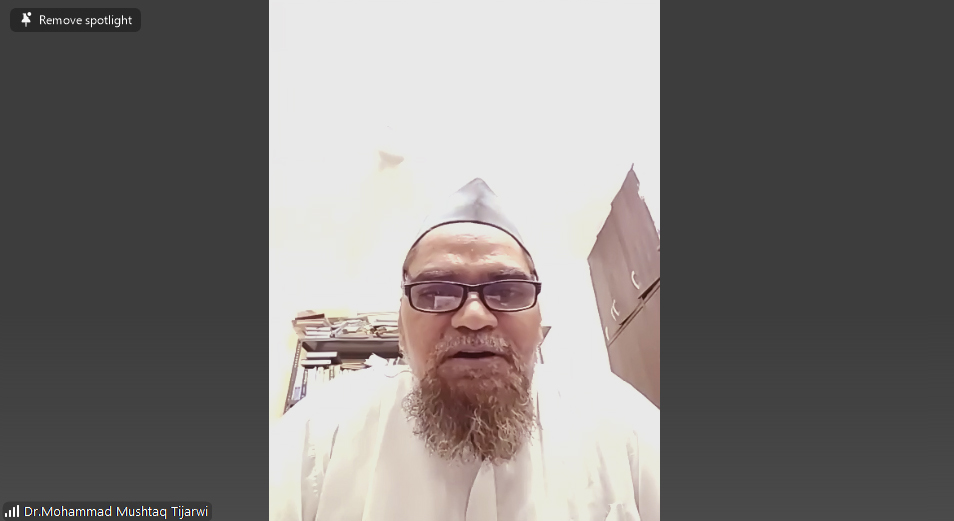
The third lecture concentrated on the Introduction to Tasawwuf. Dr. Mohammad Mushtaq, Assistant Professor of Islamic Studies, Jamia Millia Islamia, was the speaker who explained as to what the Sufism is all about. He said that the word ‘Sufism’ was derived from ‘Soof’ which was related to Ashab-i-Suffa who used to be seated on a raised platform. Soof meant cleanup of heart. In Sufism, clothes and dress are very important. Sufis were identified with their garbs. They used to wear woolen clothes and pray to Allah. Whatever they did, they did it for the pleasure of Allah. He mentioned in the book Awa’rif-ul-Ma’arif, 100 features of Tasawwuf have been described. He also observed that passing through the stage of Fana and Baqa was Tasawwuf. The Qur’an refers to the purification of Nafs (self) which is used by the practicians of Sufism. Hadith too refers to the purification of soul. Ibn Khaldun’s book Shifaus-Salihin throws light on Tasawwuf. He said that Silsilahs (Orders) came into existence after 100 years of the establishment of Islamic faith. Training in Sufi practices started and hundreds of Silsilahs came into existence. Sufism which started with the Sahabas, had 4 stages. Earlier, it is Qur’an that was recited. In Sufism, Allah is only infinite. He is Wahdatul Wujood (There is no existence, except the existence of Allah only). Barring Naqshbandi Order, all the other orders approved of Sama (Sufi music), he stated.
Day-II June 17, 2025
Business Session-II
Lecture-4
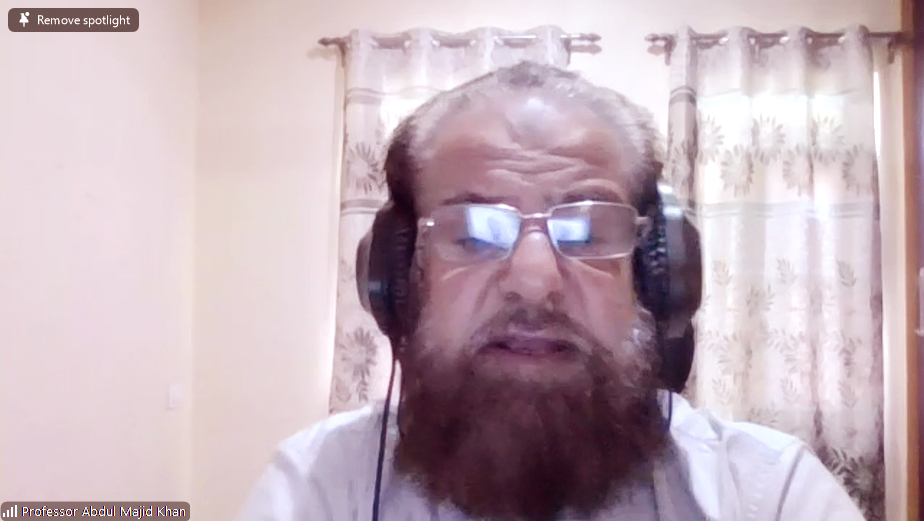
The fourth lecture centered on the contribution of Humanities and Social Sciences. Prof. Abdul Majid Khan, department of Islamic Studies, Aligarh Muslim University, Aligarh, spoke on the topic. He said that Islamic scholars were confident that the world view would be integrated with Islamic thought. He referred to the select features Islamic civilisation. One should look at the system and go to the scriptures. He said man is placed on earth and does not seem to be the total of atoms. Islam’s system is individual and social. Moral and spiritual purpose is to please God. In political science, Greeks talk of philosophical king. But there is democracy and God commands individuals. While pursuing spirituality, there was no abandoning of the world. There is the concept of khilafah. He said Riba (Usury) is prohibited under Islam. Islam allows people to go to earn with a purpose. This meant earning without exploitation. Let us see how the human society developed and how the individual was purified. The Qur’an and Hadith impacted the Islamic civilisation all over the world. He called for looking at the issues of humanity and social sciences. From Spain to Central Asia, there were so many scholars who contributed to sciences. Referring to the Artificial Intelligence (AI), he said that it was a tool which was subject to human control with responsibility. It is disconnected with God, he noted.
Lecture-5
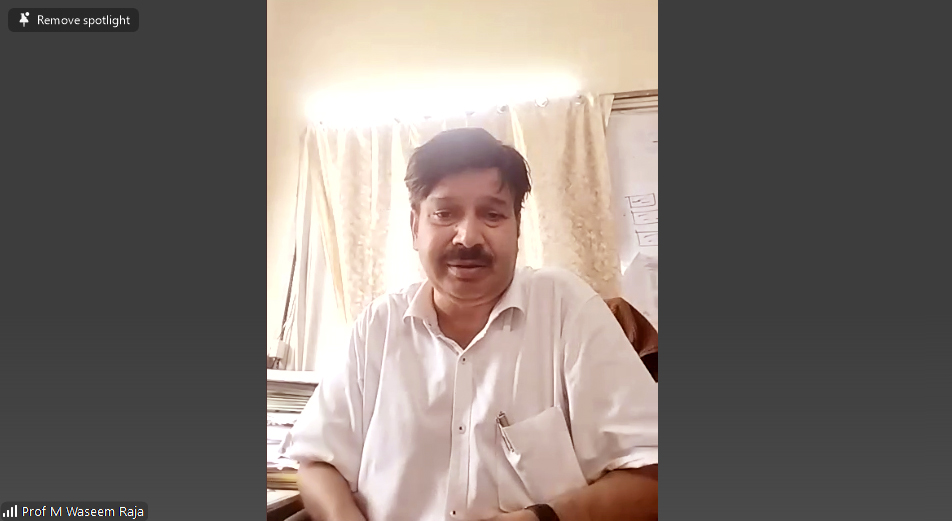
Fifth lecture was focused on the Non-Muslims under the Muslim Rule in India. Professor of the Department of History, Aligarh Muslim University, Prof. M. Waseem Raja was the speaker on the topic who stressed that it was very important in today’s context due to the acrimony between Hindus and Muslims. There was a confusion that non-Muslims were exploded by the Muslim rulers. He said that Islam came to India for the betterment of humanity. He referred to Surah al-Kafirun which says, “Unto thee thy religion, unto me my religion”. During the Muslim rule, there was no discrimination on the basis of religion. Misaq-e-Madina (Pact of Madina) also known as the Constitution of Madina said “there will be no discrimination against non-Muslims and they will be treated equally”. They were treated equally during Umayyad Caliphate. He said that in the Mughal period, non-Muslims were made to pay Jizya. It was not a punishment, but some type of contribution. They were made to pay Jizya, a kind of participation in the functioning of the state. If a Muslim officer did a wrong to a non-Muslim, he would be given similar punishment. There are instances of such punishments. He said that under the Ottoman Empire, this was practiced as per injunctions of the Qur’an.
Prof. Waseem Raja held that the Christians did not convert to Islam but came under the suzerainty of the Ottoman Empire. They were not forced to convert to Islam and were governed by Qur’anic injunctions. Adl (justice) was the corner-stone of governance. The entire Muslim brotherhood was called Ummat and Millat was on the other side. Millat system was for the Christians in which Christian clergy was appointed to enforce their religious rules. Half of Europe was under the Ottoman Empire. But Western scholars wrongly blamed the Ottoman Empire for doing discriminatory practices against Armenians. In Sindh, there was Brahmanic rule in which Buddhists were discriminated against. This practice continued until Muslims came to rule Sindh.
Prof. Raja noted that during Muslim rule, non-Muslims were allowed to practice their rituals. He observed that Mohammad Bin Tughlaq was the most tolerant ruler who allowed Hindus to freely practice their religion. He wanted to know why Hindus hated Babar even as Islam was already in existence for the last 400 years. They accused Mughals of destroying temples and killing of thousands of Hindus. Mughal period’s history was being so distorted that even the most liberal emperor Akbar was maligned. That is the myth being spread through WhatsApp university by the BJP’s IT cell. In Akbar’s army, Rajput nobility accounted for 15 percent. There were 23 percent Rajput nobles in Aurangzeb’s army. He used to call India a plural country. According to the historian John F. Richards, only 89 temples were destroyed during entire period of 800 years of Muslim rule in India. He said that Aurangzeb was not as much a bigot as was being branded. Aurangzeb gave grants to many temples, he added.
Business Session-III
Lecture-6
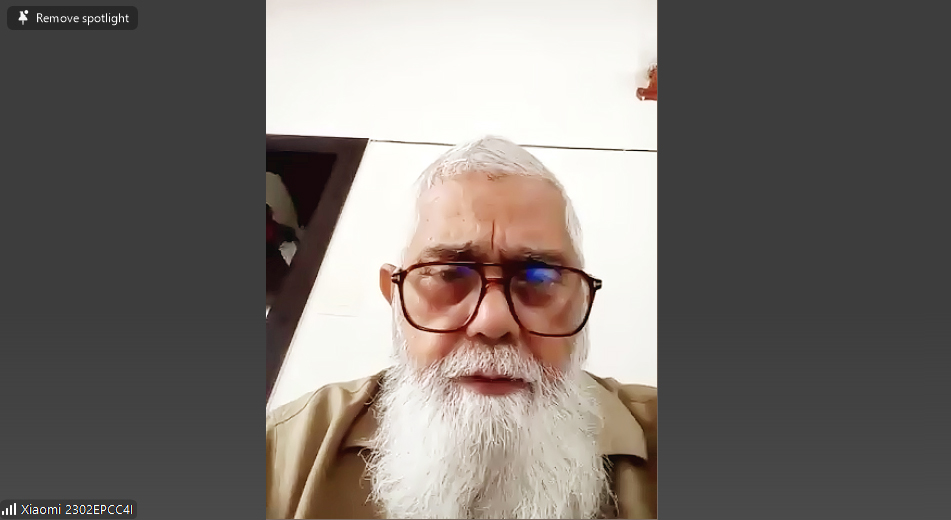
The topic of the sixth lecture was, Islam as faith and civilisation. The speaker who spoke on the topic was Prof. Syed Jamaluddin, director, IOS Centre for Historical and Civilisational Studies, Aligarh. He said our religious faith should be very strong and we should have full faith in Allah. Faith is of two kinds – Iman-e-Mufassal and Iman-e-Muzmal. In Iman-e-Mufassal, a Muslim is supposed to say, I affirm my belief in Allah, His angels, belief in the Day of Judgment, His prophet, one’s destiny and the resurrection of all human beings. In Iman-e-Muzmal, a Muslim affirms his belief in Allah and the belief in His decrees. He said that one should read Asamae-Husna (99 Names of Allah) every morning. He says when Allah orders ‘Kun’, it comes into existence. He is ‘Basir’ (Seeing everything). He says Faith applies to servitude. In Surah Rahman, He describes His blessings. Allah created the universe with His wisdom. He sent His Message through His Prophet Muhammad (PBUH). A Muslim should remember Allah from childhood till the end of life. It gives solace to remember Him, Zikr is called remembrance. We should have full faith in Allah and His Prophet (PBUH).
Prof. Jamaluddin said that there was a difference between civilisation and culture. An organised society is called civilisation. An organised society is the aim of Islam. He observed that the Treaty of Hudaybiyyah (Pact of Makkah) and the Constitution of Madina were important landmarks in the history of Islam. Referring to the cultural development of Islam, he maintained that it was the language that played an important role in understanding things. But the perfection of understanding stemmed from the knowledge of the Qur’an and Hadith. Knowledge grew from language and manuscripts of the Qur’an were taken to compile a correct manuscript. He said Hazrat Ali’s manuscript of the Qur’an is still preserved in the Maulana Azad Library in Aligarh Muslim University. Muslims contributed immensely to aesthetics. Garments and architecture were part of them. He held that the Khaljis and Mughals promoted them. Trade and commerce received a boost under Muslim rule in India. He said that there was a difference between Islamic culture and Muslim culture. Islam spread through conquests, Sufis and traders. Islam was the first religion which laid a large degree of stress on human rights, he concluded.
Lecture-7
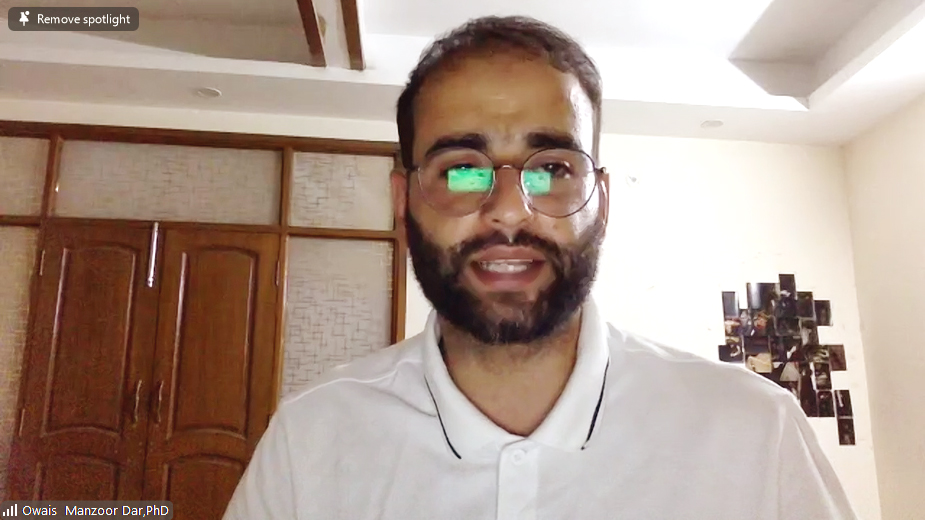
The topic of seventh lecture was Islam and Knowledge. Dr. Owais Manzoor Dar, assistant professor of Islamic Studies, Jamia Millia Islamia presented his lecture on the topic. He spoke on contemporary dimensions of Islamic knowledge. He said that there was the Qur’an and the foundational knowledge of Islam. Then there was divine knowledge and human enquiry. He also opined that knowledge was not preserved for the clergy. Blind faith without enquiry is a crisis which we are facing. Islam’s epistemological journey starts from the Qur’an and Prophetic traditions. Knowledge in Islam is tied to action. Islamic knowledge begins with Wahi (Revelation). The fact of the matter is that Islamic epistemology does not reject reason. He said reason is necessary for verifying Wahi. There was fragmentation and transmission of knowledge. There was also the marginalisation of traditional or Dini knowledge by the colonial regime which opened new schools and universities. Sir Syed Ahmad Khan synthesised colonial modern rationalism and religious knowledge. He held that epistemology should engage with the Islamic knowledge. He asked to decolonise and deconstruct western knowledge. Islamic studies must also study other social sciences like, political science, sociology etc. Inter-disciplinary approach in Islamic Studies was imperative, he added.
Lecture-8
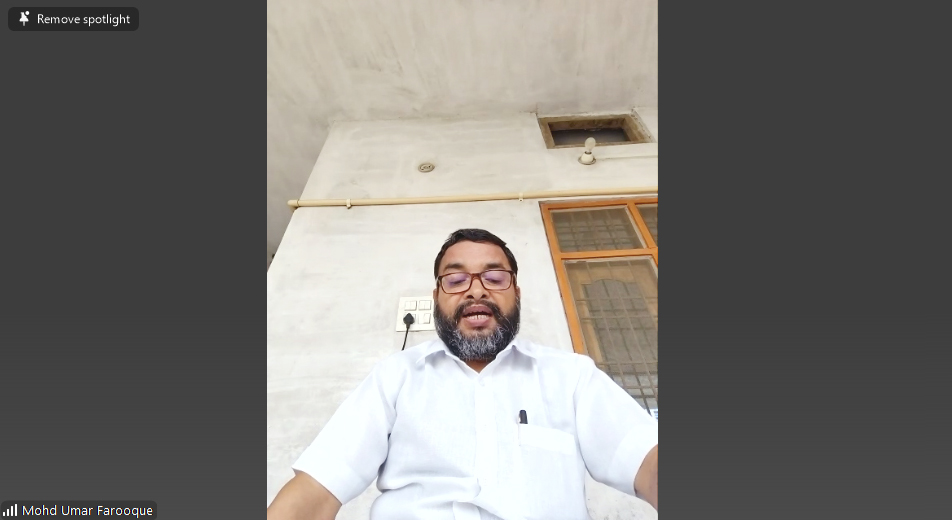
The eighth lecture was devoted to Arab Muslim Contribution to Mathematics, Medicine and Astronomy (Natural Sciences). Dr. Mohd Umar Farooque, assistant professor of Islamic Studies, Jamia Millia Islamia, touched upon the topic. He said all the Ayah of Qur’an are regularly inviting human mind to ponder over that all the eatable items are beneficial as well as harmful. Arab Muslims were asked to study natural sciences. They were also asked to differentiate between Haraam (Forbidden) and Halaal (Lawful). Arabs followed it and took interest in the study of natural sciences. They fixed the direction of Qibla (Kaba’) for offering Namaz. They made mathematical calculation for fixing the direction for undertaking Hajj pilgrimage. Referring to the analytical study, he said that ancient legacy literature of Greeks, Indians and Iranians, was translated in Arabic. Arab Muslims contribution to Physics, Chemistry, Mathematics, Geography, Cartography has been immense. They contributed to life sciences like Biology and agriculture. In the field of technology, they promoted production. Their major contribution has been in Medicine. In basic sciences, pathology and pharmacology were developed. In clinical sciences, medicine, surgery and orthopedics were developed.
Dr. Farooque held that many Ahadith were compiled. They have many narratives and some of the Prophetic Traditions are related to medicine. Zakariya Al-Razi, Ibn Sina and Abul Qasim Al-Zahrawi are known for contributing to medical science. Al-Zahrawi developed 200 surgical instruments. Wellness, healthcare, blood circulation in human body, etc., were also developed by the Arabs. They worked in the field of transition, prevention, transmission and correction of ancient texts. As far as astronomy is considered, this was in fulfilment of religious requirements. In earlier times, Arabs used astronomy for the timing of their travel. They also established observatories. They kept track of annual planetary movements and prepared calendars and Jantries (almanac). They translated mathematical books from Greek, Indian and Iranian legacy. During the Abbasid period, Indian legacy was translated in Arabic and presented before the world, he insisted.
Day-3 (June 18, 2025)
Business Session-IV
Lecture-9
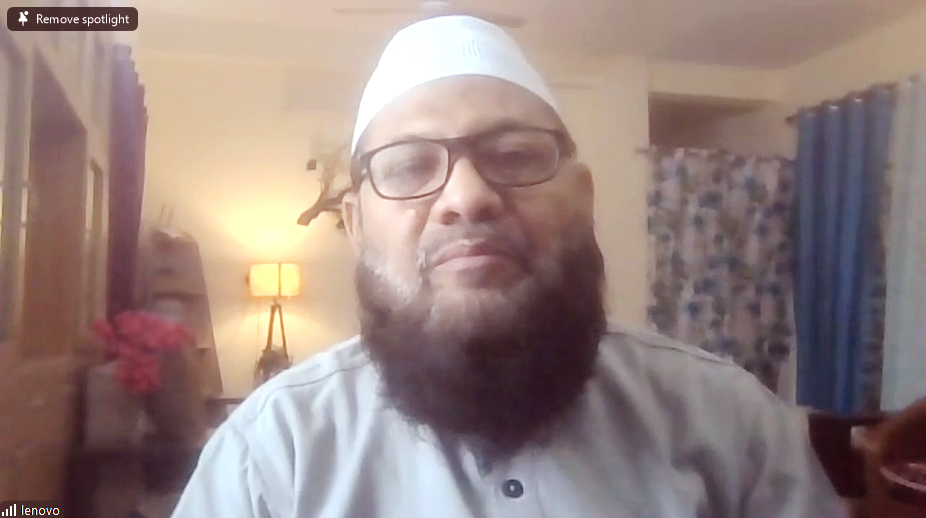
The ninth lecture centered on “Revelation and its application: Focus on Qur’an and Sunnah as sources of Shariah which led to the emergence of Fiqh”. Prof. Mohd Fahim Akhtar Nadwi, department of Islamic Studies, Maulana Azad National Urdu University (MANUU), Hyderabad, presented his lecture on the topic. He said the Qur’an came to us in the form of Wahi. Allah said Wahi has been sent to several of His prophets through Angels for the guidance of human beings. He held that it was not in deference to Allah to directly talk to anybody. He talked from behind the Parda (Veil) or sent His Wahi through His Messenger Jibreel, who appeared in the form of man and sometimes as a stranger. Hazrat Jibreel was also seen in his real form. The Prophet Muhammad (PBUH) absorbed His word in his heart. He used to memorise the Wahi and dictated to His Sahabas and corrected it. During His lifetime, Wahi used to be inscribed on stone slabs or written on leaves, hides, etc.
Prof. Akhtar said that the Prophet (PBUH) himself used to tell how to serialise the Ayah. Since Wahi came from Allah and therefore there was no room for any dilution in it. Allah took on Himself the responsibility to make the Prophet (PBUH) to memorise His word and make it sure that nobody could alter or make any change in it. Allah Himself took the responsibility to preserve the Qur’an. He held that the scope of Wahi is beyond the reach of man. No scientist has till date stated when the death would approach or the doomsday would happen. Scientists figured out results on the basis of their research. Results are amenable to change. He said the narratives of the Prophet Muhammad (PBUH) are called Hadiths. Commenting on the resources of the Qur’an, he said that the written Qur’an was available before the death of the Prophet (PBUH). After His death, the Qur’an was fastened with a thread. Caliph, Hazrat Usman Ibn Affan prepared the Qur’an in Quraysh script. Hadiths were written in the lifetime of the Prophet (PBUH). There were 252 Ahadith with the Sahabas which were written by them. While the Qur’an is the first source, Hadith is the second source of Islamic knowledge. He concluded that Islamic law (Shariah) is nothing but the Qur’an, Hadith and Ijtihad.
Lecture-10
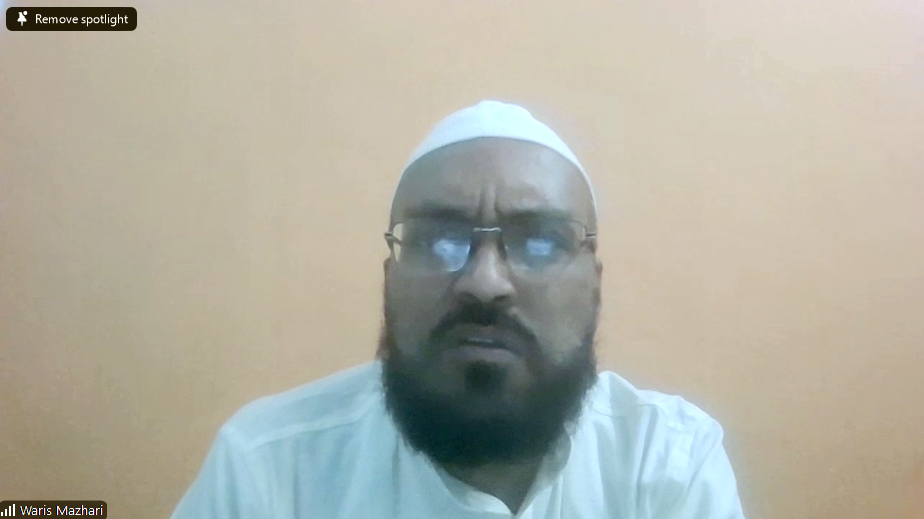
The tenth lecture focused on non-Muslims during the time of the Prophet Muhammad (PBUH). Dr. Waris Mazhari, assistant professor, Islamic Studies, Jamia Hamdard, New Delhi was the speaker. He said that in certain circles an impression was being created that during the lifetime of the Prophet (PBUH), there was prejudice against the non-Muslims. This was being done by some people to target the Prophet (PBUH). During His time, non-Muslims constituted 60-70 percent of the population. All of them were Ahle-Kitab (People of the Book) and lived in Syria, Iraq, Yemen, Madina, Khyber and Fidaq. They were either Christians or Jews, but the former were in a strong position. Jews were engaged in business and their social status was very high. Zoroastrians were also there, but in small numbers compared to the Christians and Jews. Some of them were followers of the religion of Hanif. It referred to pre-Islamic Arabians who were Abrahamic monotheists. He noted that Hindus and Buddhists were there due to good relations between Arabia and India.
Prof. Mazhari observed that Prophet’s (PBUH) relations with the non-Muslims were same as with the common people. He related to a story in which a Jew had lent some money to the Prophet (PBUH). He used to attend feasts hosted by Jew women. Whenever a funeral procession passed by him, he used to stand up. Later, he (PBUH) was victimised. Some of his companions asked for revenge on the tormentors. But the Prophet (PBUH) did not approve of reprisal. Attempts were made to sully the image of the Prophet (PBUH). Jews were allowed to remain in their posts in the Treaty of Madina. Sahabas also continued to treat the non-Muslim in the same manner. According to a German scholar, Zimmis (Non-Muslims living in an Islamic state with legal protection) also received equal treatment, he added.
Business Session-V
Lecture-11
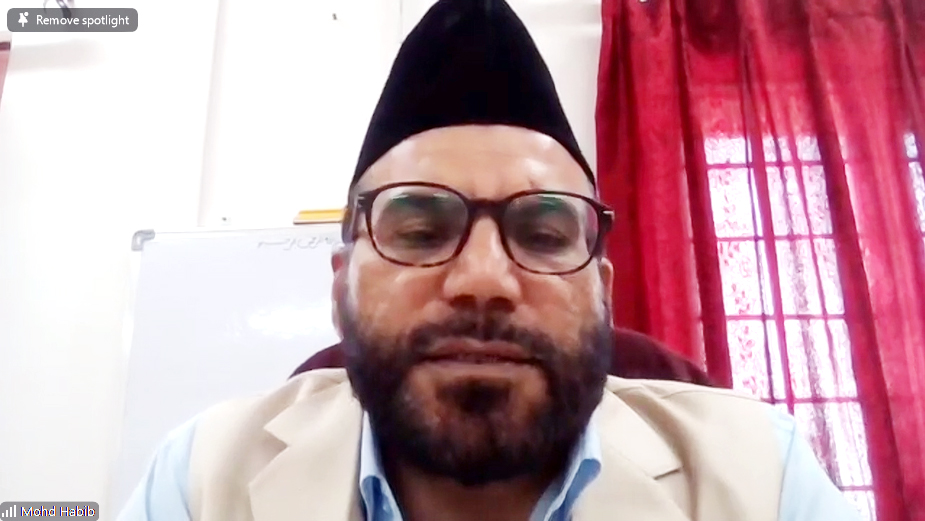
The eleventh lecture was devoted to “Islam and multi-culturalism: Modern debate and Islamic position on the subject”. Head of the department of Islamic Studies, MANUU, Prof. Dr. M. Habib spoke on the subject. He referred to the last khutba (sermon) of the Prophet Muhammad (PBUH) which should be learnt by all the Muslims. All the people must co-exist. It is important because of the threat of the third World War. It is the co-existence of culture; it is not poly-culturalism or pluralism. However, where there is poly-culturalism, the government is duty-bound to ensure co-existence. He said that during the Umayyad rule, it was started and it became prominent during the Ottoman Empire. In the modern context, after the third world war, the Western society strongly felt the need for it. After the end of colonialism and the Holocaust, liberalism became the hall-mark of multi-culturalism. It was thought that multi-culturalism should be adopted. In order to put a break on conflicts, League of Nations was established. He said multilateralism is associated with cooperation, inclusion and the global issues, like climate change, pandemic, etc. It was thought that the global issues should be collectively addressed. It was also thought to develop diversity and ensure progress at national and international level. Things should be seen in the new perspective. A new theory of ‘Melting Pot’ was evolved to melt contradictions. Later, it became of ‘Salad bowl’ theory, he added.
Lecture-12
This lecture focused on “Non-Muslims under the Muslim empire: Umayyads of Spain and Ottomans”. Dr. Mohd Umar Farooque presented his lecture on the topic. He said that Islam always talked of diversity at racial and cultural level. It was based on the Constitution of Madina. Walid Bin Abdul Malik established the Muslim empire in Spain and Portugal and made the maximum use of local talent without consideration of their religion. Owing to the inclusion of non-Muslims in the governance, the Muslim rule lasted 800 years. This left a lasting imprint on Christians and Jews and a majority of them embraced Islam. Muslim rulers were tolerant to the followers of other faith, including the Shias. They did not promote conversion to Islam. Under the Ottoman Empire, Millat system was introduce to fix rights of the population. Then there was Millat-e-Ghair Islamia under which Christians and Jews were brought. He said that inter-religious marriages among upper and local classes took place.
Lecture-13
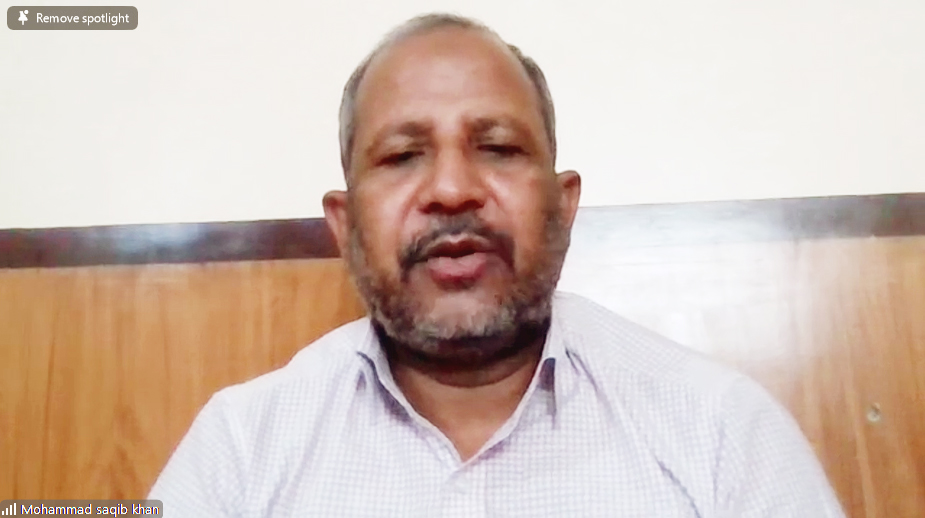
The thirteenth lecture was devoted to “Non-Muslims under the Muslim empires: The Umayyads and the Abbasids”. Dr. Khursheed Afaq, assistant professor of Islamic Studies, Jamia Millia Islamia, spoke on the subject. He observed that two tribes of the same clan ruled for 600 years. Credit goes to Bani Umayyad to go beyond the boundaries of Islam and expand it. The most important feature of their rule was that they ruled for 60 years and majority of the people were non-Muslims. Unani literature, culture and science were translated into Arabic during the Umayyad Caliphate. During their rule, Muslims were 10 percent. Thus both the tribes ruled over the majority and their rule was based on rightful policies. During the rule of Banu Abbas (or Abbasids), non-Muslims were used as Zimmis. They were both Ahl-e-Kitab and non-Ahle Kitab. In Sindh, he said, both of them were given equal rights. Brahmins requested Mohammad Bin Qasim that they should be given religious rights which he acceded and allowed a temple for them to be built. Jizya in the form of security tax was charged from them. But the Western scholars condemned it and called it biased. After the imposition Jizya, the protection of their life and property was guaranteed by the state. For this purpose, a separate court was set up to try their cases. Several scholars accept the fact that the life of non-Muslims that time was comparatively better, he added.
Day-4 (June 19, 2025)
Business Session-VI
Lecture-14

This lecture was devoted to Jama wa Tadween Hadith. Prof. Shamim Akhtar Qasmi, department of Theology, Aliah University, Kolkata presented the lecture. He said that the Qur’an is the wealth of life. The Qur’an is the direct word of Allah. The compilation work of Hadith was completed in the lifetime of the Prophet Muhammad (PBUH) himself. Sahabas used to jot down the narratives of the Prophet (PBUH). Many Ahadith were written in his lifetime. The Prophet had written to several rulers in this connection. These too fall in the category of Hadith. He disallowed certain Ahadith while allowing the rest to be written. He observed that some problems cropped up during the Rashidun Caliphate. Shias came out with many Ahadith during the Caliphate of Hazrat Ali. After the death of Hazrat Ali, an atmosphere of utter confusion ensued with Shias taking their belief forward. During the reign of Umar bin Abdul Aziz, Ahadith written voluntarily piled up. This had far-reaching consequences. During this period a large number of Ahadith were collected. Imam Malik’s name is notable in this respect. His place in the collection of Ahadith comes only after Sahi Bukhari. Imam Al-Shafi’i’ sorted out these Ahadith and compiled them in book form. Attempts were made to weaken the Ahadith after Europe underwent transformation. Ahle Tashi (Shia Muslims) played a key role in making the Ahadith suspect, he remarked.
Lecture-15
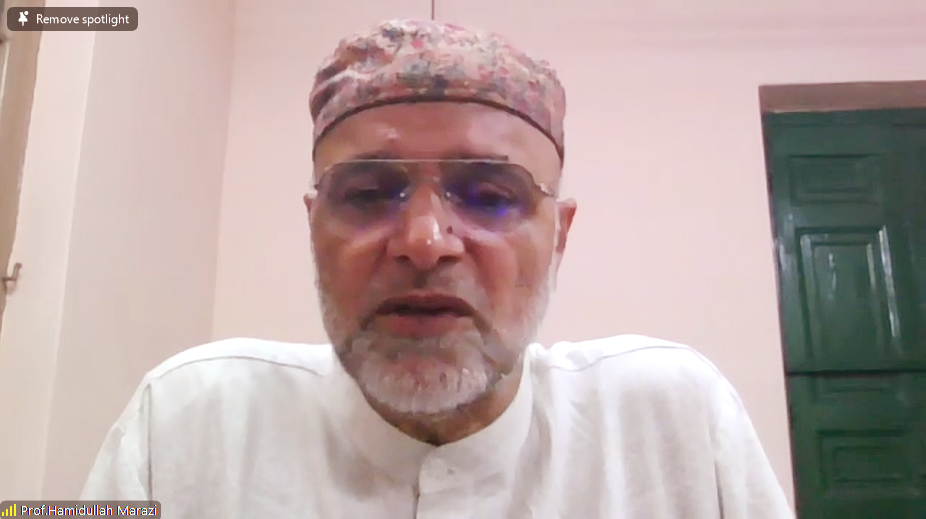
The fifteenth lecture centered on “Islamisation of Knowledge: Belief system in Islam”. The lecture was presented by Prof. Hamidullah Marazi, visiting professor, ISTAC, IIUM, Malaysia. He said basic leadership started from Adam. Without Tawheed, there is no Islam. Without belief in the Prophet Muhammad (PBUH) there is no Islam. The Prophet said, “Worship Allah and believe in Tawheed”. Belief in Risalah, Ibadah and Itah (follow the Prophet) forms the basis of Islam. This is also called Tawheed. While Tawheed is the foundation others are secondary. Prophet (PBUH) is the model who told us how to worship Allah. In respect of the life, follow the life of the Prophet. He observed that the Prophet (PBUH) spent 13 years in Makkah to explain Tawheed. Tawhid is nothing but monotheism. “Allah did you a great favour by sending the Prophet Muhammad (PBUH) to you.” More than 300 idols were placed in Makkah because the Makkans believed in so many gods (Polytheism). Tawheed became the principle of Islam. Risalah is the message of Allah through Revelations. Sometimes dreams also became sources of Revelation. Revelation is the best source of guidance and Hidayah comes through Revelation. He said that prophets were sent in different parts of the world. But, perfect worship was made in Islam only. No other religion, whether Christianity or Judaism, had the perfect mode of worship. He concluded saying that Tawheed belief in Akhirah, belief in Allah and belief in the prophets formed the basis of Islamic epistemology.
Lecture-16

The sixteenth lecture was devoted to “Globalisation and Islam”. Dr. Syed Mohammad Fazlur Rehman, assistant professor of Islamic Studies, Jamia Hamdard was the speaker on the topic. He said that the term globalisation was first used in 1930. It became popular by a book that was published in 1960. The word ‘globalisation’ started in economic terms. Globalisation is in use today. Lately, it became popular when the wall of Germany was dismantled. This is an alien word to Islam as it encourages us to know each other. A group of scholars believed that the globalisation was being imposed by the West, particularly the USA and Great Britain. He opined that differences among Muslims were triggered by globalisation. The negative effect of globalisation was Islamophobia which created hatred against Muslims. There were differences between the USA and Russian scholars on the globalisation which became an ideology. Many a time it was used by the powerful countries to promote commerce. Both Russia and Malaysia opposed it saying that the globalisation should not be restricted to powerful countries. In order to strengthen the market, globalisation, was used through 17 network and social media platforms. He remarked that globalisation could not be a hindrance to an Islamic political system. IT and Hajj were the best examples of globalisation, he insisted.
Lecture-17
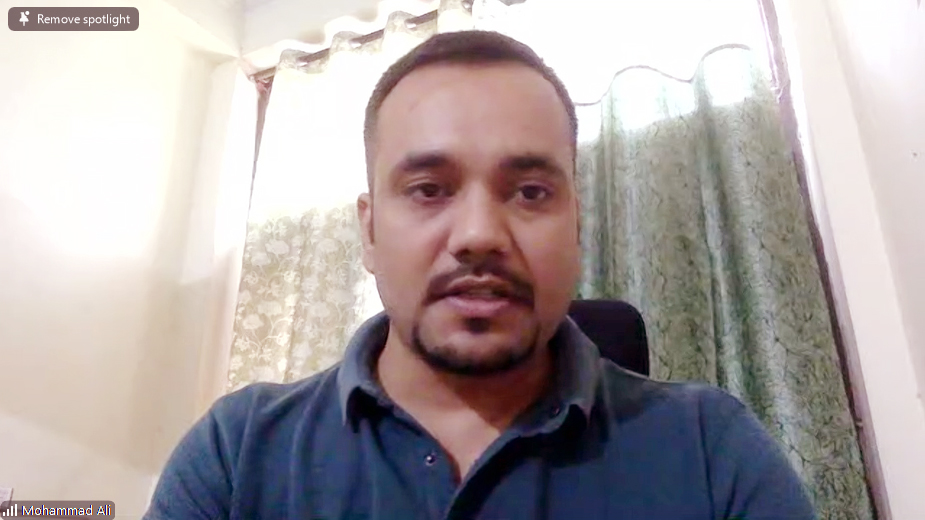
The topic of the seventeenth lecture was “Islam and modernity”. This was discussed by Dr. Mohammad Ali, assistant professor of Islamic Studies, Jamia Millia Islamia. He said that in Islam, ethics and morals are drawn from the Qur’an and Sunnah. Theory and practice is distilled by ulema and Islamic scholars who interpret Islam. In the context of science and difference of opinion, changes in practice may be based on one’s experiences. He noted that social changes were brought by modernity. Theory, practice and social change are inter-related. Modernity is a long process of social change which continues even today. Social change is a theory put forward by Western scholars. Scholars employed several theories to understand social change. He said that the word ‘modernity’ was coined in the 19th century. Epistemological changes took place due to the plurality of knowledge and its proliferation. Colonialism played a major role in the expansion of modernity. Scholars started to categorise Islamic knowledge. Social change was very deep. Both Sir Syed Ahmad Khan and Dr. Mohammad Iqbal were also in favour of modernity. Modernity has changed our experience, he added.
Lecture-18
Eighteenth lecture was the last lecture of the session VII which focused on “Islam and Secularism”. Prof. Hamidullah Marazi spoke on the topic. He held that secularism was neutral and not religious. It meant separation of church and the state. Modern democracy is a secular democracy. It is not divine. It is by the people and for the people. Unlike secularism, Islam provides moral compass. Western democracies are based on popular consent by the majority. But the mass opinion can be manipulated by media. Besides, there is no moral agenda in secularism. It was suited to the ruling class. Secularism is uncomfortable with the Islamic system of governance. Secularism is based on western philosophy. Philosophers like G.W.F. Hegel, Jean Paul Sartre and Bertrand Russell were the protagonists of secularism. But Indian secularism is different from the Western secularism. In Western secularism, state will not interfere with religious matters. In India, the Constitution guarantees fundamental rights and minorities have been given the right to open their schools. Islam does not recognise secularism. In Islam, Tawheed, Risalah and Aakhirat are the corner-stone of belief. He said that scholars should evolve a consensus by the way of dialogues and interactions and civilisational interactions. People should co-exist and live peacefully. Islam has a complete code of conduct. In Islam, there is no separation of religion from politics, he added.
Day-5 (June 20, 2025)
Business Session-VIII
Lecture-19
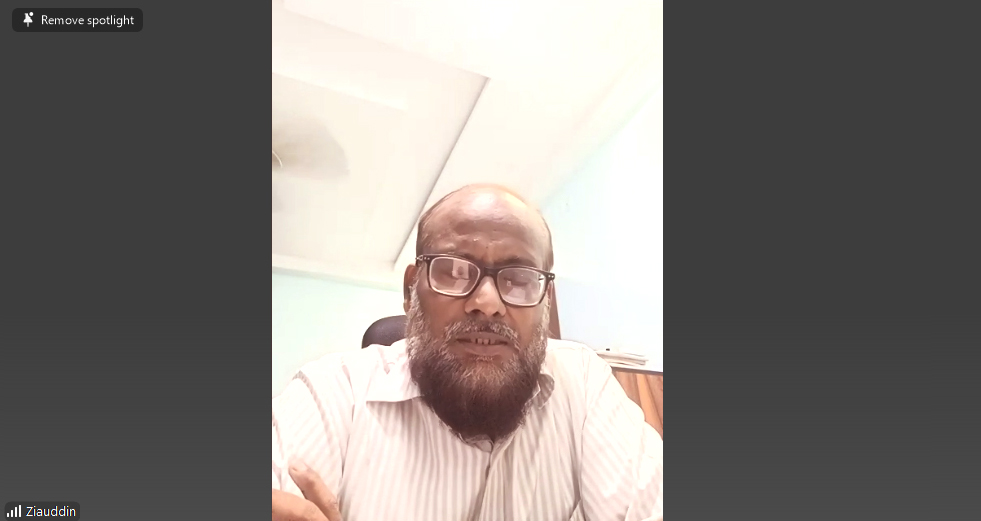
Nineteenth lecture was devoted to “Islam and World Peace”. Prof. Ziauddin Malik Falahi, department of Islamic Studies, Aligarh Muslim University, Aligarh, spoke on the subject. He held that Islam and Christianity had been in the fore-front of the restoration of peace. Peace would be restored if the fear of God was there. Peace had reference in several religions, but the ground of peace was very strong. This could be understood in the Islamic perspective. Islam sows the seeds of peace from the individual to the society. Islam wants peace in society. Islam gives protection to the rights of an individual and speaks of peace. Heart, body and soul work together, but they require proper and mutual balance. Islam tells us how to restore peace and strike a balance. He said that it was the duty of the state to make proper distribution of wealth, levy and taxes and provide protection to the people. Islam promotes Jihad which is aimed at enforcing the word of Allah. Islam ended civilisation anarchy in the world. He asked for rigorous spiritual and physical efforts for the restoration of peace.
Lecture-20
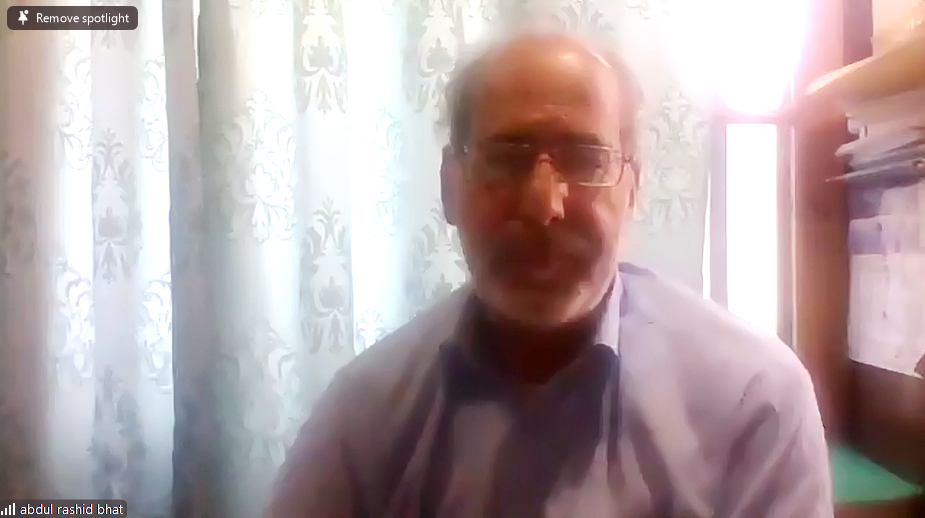
The twentieth lecture focused on “Islamic Studies – Challenges and Prospects”. Prof. Abdul Rashid Bhat, former head, Shah-i-Hamadan Institute of Islamic Studies, University of Kashmir, Srinagar presented the lecture on the topic. He held that Islamic Studies was the broader academic discipline studying Islam and the Muslims vis-à-vis the historical and intellectual development. It is a multi-disciplinary and inter-disciplinary subject. It has assumed many nomenclatures in the last three centuries. In the modern times, it has become widespread, yet faces new challenges. He said that Islamic Studies was defined in a variety of ways. It is affected by contexts and purposes. Islamic Studies as a university and higher education academic discipline owes much to the West in the modern times (Colonial, Semitic and religious Jewish and Christian). It is also termed as the Middle East and Near East Studies, West Asian Studies, etc. He said theology in broader sense is not merely scholasticism. Shariah studies/Islamiyat can be treated in ways of redefining of Islamic Studies. It is also related to the Muslim orientation of Islamic Studies in the Muslim countries and societies. Madrasa education plays an important role in the study of Islamic Studies. Scholars like T W Arnold Smith (British India), Abdul Aleem and Syed Maqbool wrote much on the subject. In India, its centres and research expanded considerably. He noted that Islamic study was meant to make the study of Islam in a proper, relevant and productive way.
Business Session-IX
Lecture-21
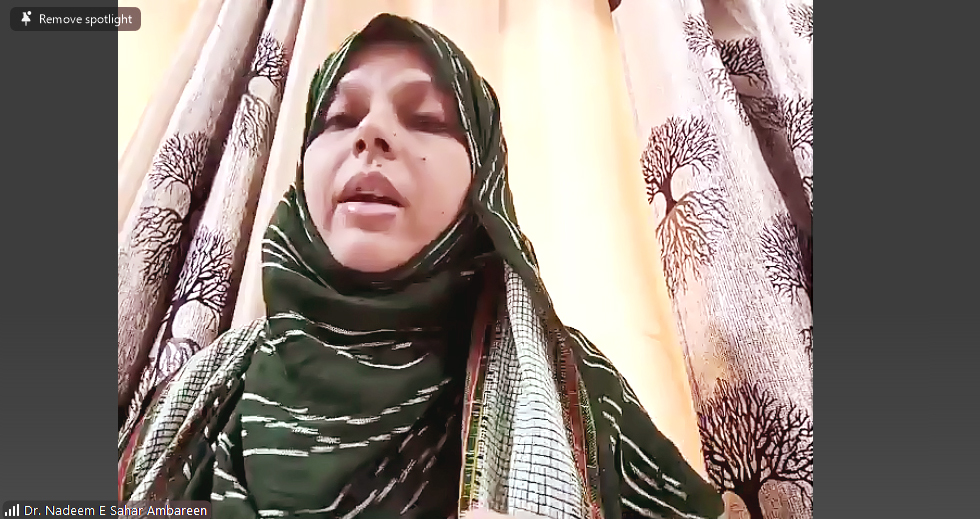
The twenty-first lecture centered on “Islam and Education of Women”. Dr. Nadeem-e-Sahar Ambreen, assistant professor of Islamic Studies, Jamia Millia Islamia touched upon the topic. She said that Allah first sent Wahi which said, “Read”. These Ayah lay emphasis on acquiring knowledge by way of education. Knowledge is very important because everything depends on it. The Prophet Muhammad (PBUH) had a position of an educator. Allah sent him for educating people who were not educated. Islam does not define knowledge, but Ayah impress upon us to acquire knowledge. Education should be promoted because it is a noble act. Barring some areas, all the work is done by the women along with men. According to the Qur’an, there is no distinction between men and women as far as the work are concerned. The Prophet Muhammad (PBUH) used to say that he learnt half of knowledge from Hazrat Ayesha (RA). That is why the house of Hazrat Ayesha (RA) had become a school. Besides, there were several women educators who used to educate others. All of them illuminated society by their noble deeds. The Prophet (PBUH) was an educator who used to teach both men and women folk. Women education had become a challenge. Education was beneficial only when it reached the maximum people, she added.
Lecture-22
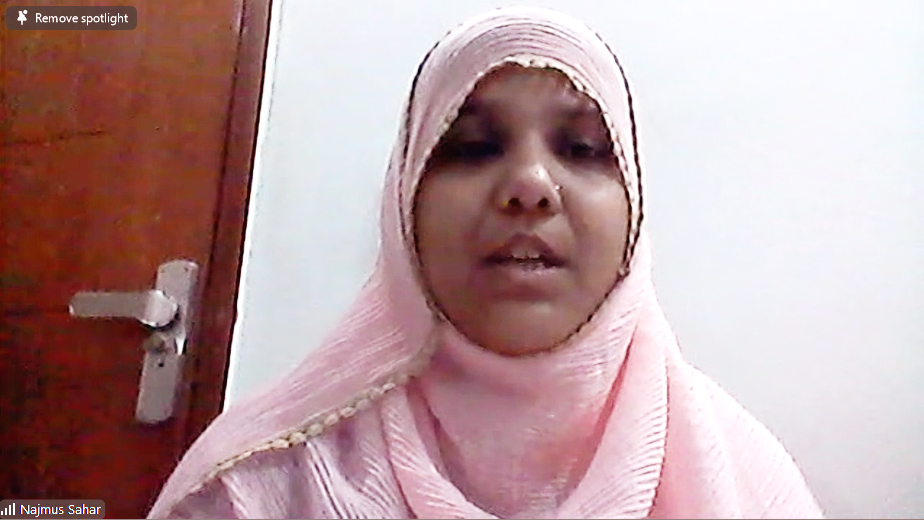
The last lecture of the session focused on “Influence of Islam on Hindu Culture”. Dr. Najmus Sahar, assistant professor of Islamic Studies, Jamia Hamdard, New Delhi spoke on the subject. She said the relations between India and the Arabs dates back to the pre-Islamic period. Hindu rulers were also influenced from Islam. But the expansion of Islam began during the Caliphates. Hindu rulers came into contact with Islam after reading the Islamic literature. This was followed by religious and intellectual exchanges. Sufis too played an important role in attracting non-Muslims towards Islam by their teachings of love and compassion. She said that during the Caliphate of Hazrat Umar (RA), a Hindu King (raja) went to meet him and enquire about the Prophet Muhammad (PBUH). He died on way back home. Hindu Rajas and Maharajas also studied about Islam before its advent in India. Once a Hindu King had dreamt that the Moon was split halved. After waking up, the King embraced Islam. Many Hindu Sadhus and saints adopted Islamic teachings. Dr. Sahar observed that the Kayasthas and Kashmiri Pandits also played a significant role in the promotion of Islamic culture. Historians, like Dr. Ishwari Prasad and Dr. Tarachand also accepted the influence of Islam on Hindu culture. Historian Sir Jadunath Sarkar and the noted scholar, Dr. B. N. Pande too eulogised Islamic culture. Thus, a new culture called the ‘composite culture’ came into existence, she concluded.
Valedictory Session
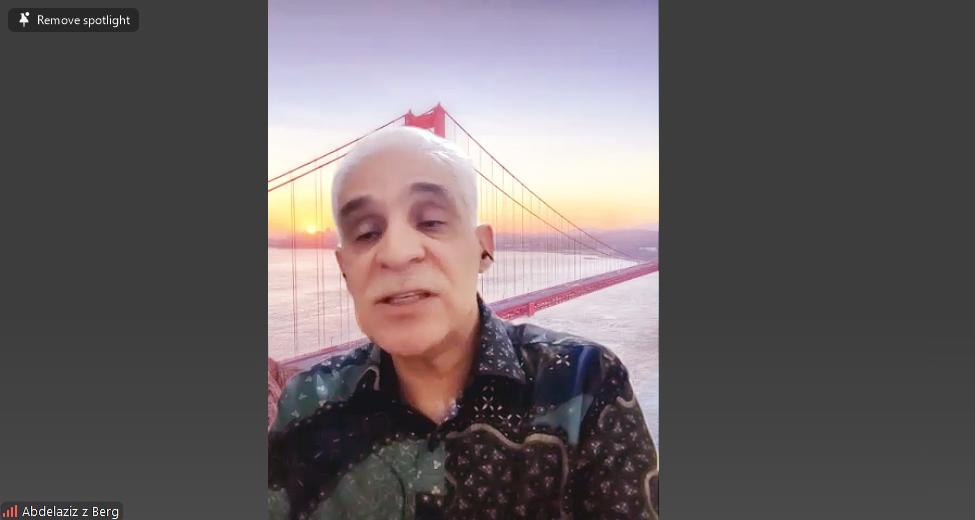
Speaking as the guest of honour, Dean, International Institute of Islamic Thought, IIUM, Malaysia, Datuk Prof. Dr. Abdelaziz Berghout described the school course as an exemplary summer school. He called for working for Islam and Shariah. Islam advocates human rights, rights of all human beings are dignified and deserve respect. Being human beings amounts to saving other human beings. These are the Maqasid-e- Shariah. The Qur’an calls for mercy to others. It was a call to the Prophet Muhammad (PBUH) to show mercy to all. He explained the Islamic principles of knowledge. There should be respect for scholars. By this knowledge, we can solve our problems. Islamic knowledge should be used to serve Ummah. He said that this 5-day summer school on Islamic Studies discussed the multi-disciplinary knowledge. Islamic knowledge should be used for the welfare of society and the development of mind, personality and character. Allah created men and women. He likes those people who are pious. Civilisational values include respect for others, and their culture. Our relations with others should be of care and tolerance. Islamic knowledge should also be used for solving the problem of poverty. One has to understand the Islamic knowledge to balance things. Muslims must impress on others. Islamic knowledge is crucial and should be shared, he added.
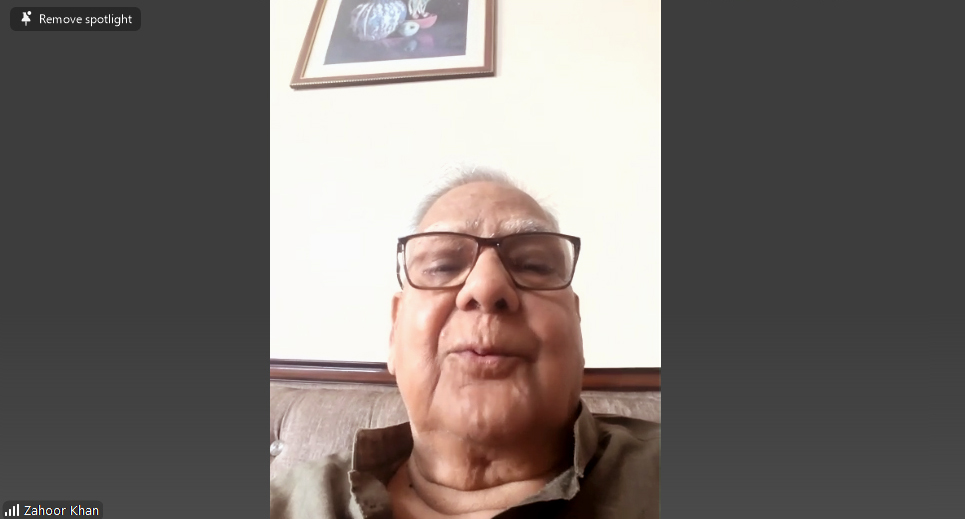
As a key-speaker, Patron of the IOS, Prof. Z.M. Khan said, “We have to be very alert in our understanding. Islam gives much respect to women. Everyone has his own share of work. Knowledge should be integrated. Man bears spiritual and moral character. The whole lot of knowledge should be for specific area. He said that revealed and worldly knowledge should be balanced through research. Hadith should be interpreted and if there is any doubt, it should not be interpreted. Islam should infuse knowledge among people. Education system should be inclusive to make it more comprehensive. He held that corporatisation of education made it very costly. Creation of human society should be the aim of education and constant efforts should be made in that direction. We have to work on them with hard work. Islamic Studies should be more exhaustive. Religious and worldly knowledge should not be seen as separate, he added.
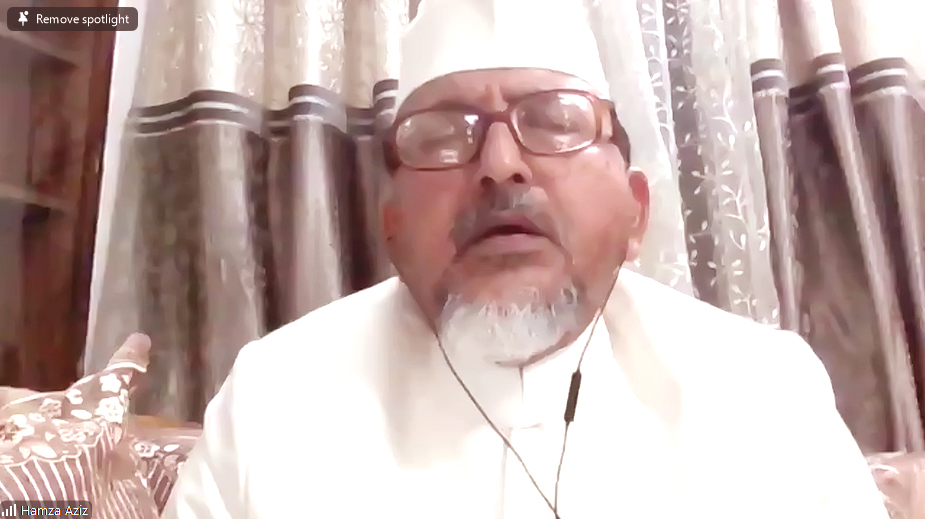
Prof. Towqeer Alam Falahi, department of Sunni Theology, Aligarh Muslim University joined as a special speaker. He described the programme as very meaningful. From the perspective of approach, Islam was more practical. Islam stands on 5 pillars of which four are practical. Islam is four times better than other faiths. Tawheed and Risalah are very important. If secularism means tolerance, then Islam is most secular. But according to Islamic view, religion could not be separated from the State. Islam is the religion of peace and calmness. Since Islam is the religion of humanity, it wants world peace. Islam says killing of one person amounts to the killing of the entire humanity.
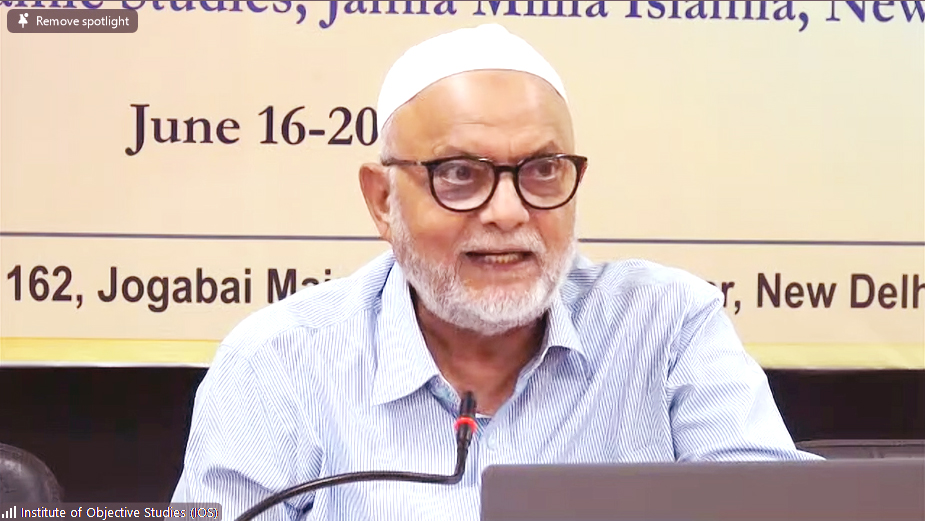
In his concluding remarks, Prof. Mohammad Ishaque, former professor of Islamic Studies and ex-dean faculty of Humanities and Languages, Jamia Millia Islamia said that the summer school programme on Islamic Studies was very comprehensive with multi-disciplinary approach. In this programme, Islam’s contribution to the world was critically discussed. Comprehensive knowledge of Islam should be used for empowerment. During the last five decades, there has been spurt in disinformation campaign against Islam through TV, media and social media platform. We should be aware of rich heritage and legacy of Islam. This is the legacy of humanity. He called for comprehensive understanding of Islam.
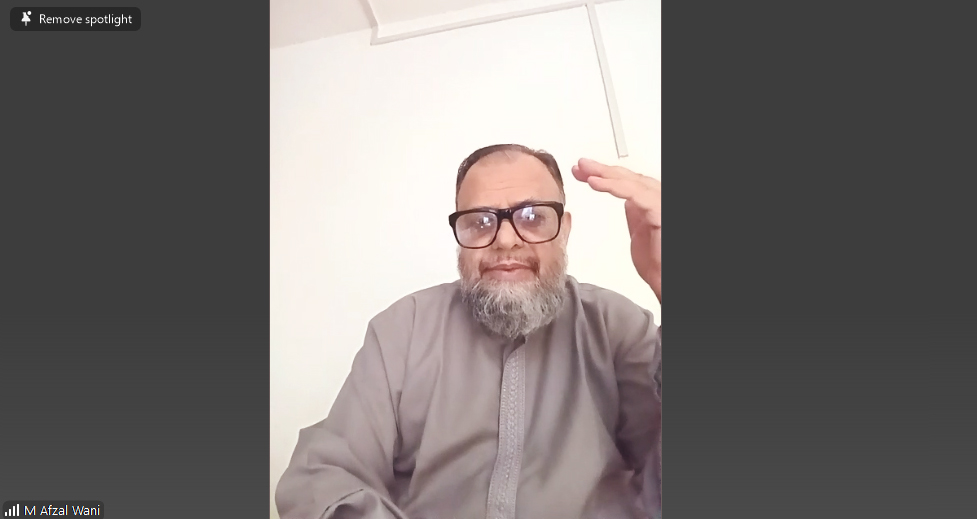
Presiding over the session, Chairman of the IOS, Prof. M. Afzal Wani shed light on the purpose of the summer school programme on Islamic Studies. He said that it was aimed at giving a deep knowledge to students about Islam. The other purpose was to introduce the IOS to them. It was organised to enable the new generation to have better understanding about Islam. As ‘Khair-e-Ummat’, Muslims should show their attributes with evidence. They should focus on different attributes in business, science, engineering, technology, etc., so that they could come out with new ideas. They should think of questions, suggestions and solutions. He suggested to translate 50-60 odd texts in different contexts and come out with solutions. Referring to the Artificial Intelligence (AI), he said we can use it to find out better answers to Islamophobia. Let us think how to use means and ways to tell the people about them. Sometimes people misinterpret things. So, the advanced technology too should be employed to correct them. He said that Islamic ethics should be used in business, science, engineering, etc. Professionals should use them day and night. They should see how Islam was connecting with them. They should play a leadership role by their research and convert it into practice. The Prophet Muhammad (PBUH) is ideal for us. He asked the professionals to be relevant to the present situation.
At the conclusion of the five-day summer school programme on Islamic Studies, Prof. Haseena Hashia extended a vote of thanks to the participants and expressed her gratitude to the speakers.
Go Back